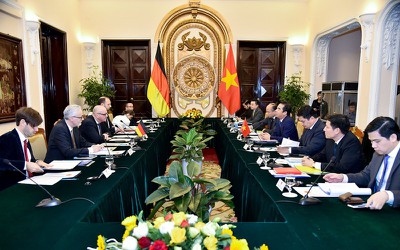As part of the OAV-German Asia-Pacific Business Association delegation to Vietnam, former Vice Chancellor of Germany and Federal Minister of Economics and Technology Philipp Rösler discussed with VIR’s Tung Anh the German investment opportunities linked to the upcoming landmark deal.
 |
|
former Vice Chancellor of Germany and Federal Minister of Economics and Technology Philipp Rösler
|
German businesses have invested in Vietnam for a long time, yet numbers remain modest. What trends have you seen for German investment in recent years, and in which sectors do you expect more here in the future?
Vietnam boasts a very good investment environment, a growing middle class, and strong economic growth, and it is becoming more and more exciting. With around 300 German enterprises active in Vietnam, we have many companies that already have a footprint in the country, but there are also many companies that are coming to Vietnam for the very first time.
On the back of global geopolitics, I think a lot has been done in Vietnam in manufacturing and digitalisation in particular. A lot of companies, especially big brands, are working on digitalisation of their production processes incorporating ideas of Industry 4.0. As part of our delegation programme organised by the OAV, we visited VinFast, which is working closely with dozens of German automobile industry suppliers and IT companies, like SAP Vietnam and others.
We also met the technology company FPT, which is a fascinating firm that works with many German companies already. I think over the last two or three years there has been a shift and German investors are realising the vast opportunities in all economic sectors across Vietnam.
A number of German firms and banks are working with several lenders on possibilities of providing sustainable financing. For example, one of the biggest insurance companies in Germany, HDI Global, has a dedicated strategy and policy to invest in Vietnam.
Vietnam is working on strategies to ensure sustainable economic growth and to attract foreign investment at the same time. What lessons should Vietnam learn from Germany in order to reach these goals?
Although we are living in a digital economy, we still need something tangible. Infrastructure is an important factor for sustainable development and part of the physical infrastructure are streets, highways, railways, and buildings. The other is certainly electricity supply.
Talking about sustainability, I think it is a good idea from the federal government to promote renewable and clean energies. Using gas, LNG for example, is much cleaner than dirty coal power. This is one strategic approach to modernise the economy, but on a very sustainable basis.
The finance industry is following this trend and not only supports sustainable investment in environmental, social, and good governance projects, but also supports the application of new technology that can help to solve environmental challenges. And since Germany is a very technologically-oriented country and economy, I think we can contribute a lot. For example, increasing the energy efficiency in buildings but also helping to advance the digital and sustainable economy in Vietnam.
So sustainable investment as well as energy security is quite important. I think it is a comprehensive approach if you finance sustainable business models, and is the best way so we can devise a plan already in place to focus on inbound investments. Vietnam should ensure that only the best companies are coming, which not only creates fast profits but more sustainable development. Vietnam should change investors’ perspective of coming to Vietnam simply because of low labour costs, and focus on improving available supply chains, regional connectivity, database availability, and technology application.
The EU-Vietnam Free Trade Agreement is expected to come into effect next year. How will German firms tap into the opportunities created by this vital deal?
It will widen opportunities for German enterprises in Vietnam in different sectors, and many are already eager to expand here.
Some companies are coming here for food exports, but also food processing, because when you produce agricultural products to enter the European market, they will have to comply with very high standards, in terms of pesticides and chemicals being used during the processing and packaging aspects, for example. So this is an area where German companies can support these local producers to ensure their products meets the expectations of European customers.
The OAV-German Asia-Pacific Business Association covers 30 countries. Given the favourable conditions, we pay a lot of attention to the fast developments in Vietnam and might carry out similar business trips in the future. The business delegation last week to Vietnam aimed to help German firms attain more knowledge about the business environment and new possibilities in Vietnam. We visited Ho Chi Minh City, Hanoi, Danang, and Haiphong and met with local champions like Thaco, FPT, T&T Group, Vinfast, and Hoa Phat. Participants were impressed with the many business opportunities and plan to investigate investment options further.
Tung Anh (VIR)

2020 important year for Vietnam-Germany ties
The year 2020 will mark the 45th anniversary of Vietnam-Germany diplomatic ties, adding fresh impetus to economic, trade and investment relations between the two countries.

Germany pledges US$235 million in next two years for Vietnam's green growth
The funding will focus on energy, environment, and vocational training in the next two years.
 German businesses are looking at Vietnam to grasp new opportunities ahead of enforcement of EU-Vietnam Free Trade Agreement, scheduled for next year.
German businesses are looking at Vietnam to grasp new opportunities ahead of enforcement of EU-Vietnam Free Trade Agreement, scheduled for next year.